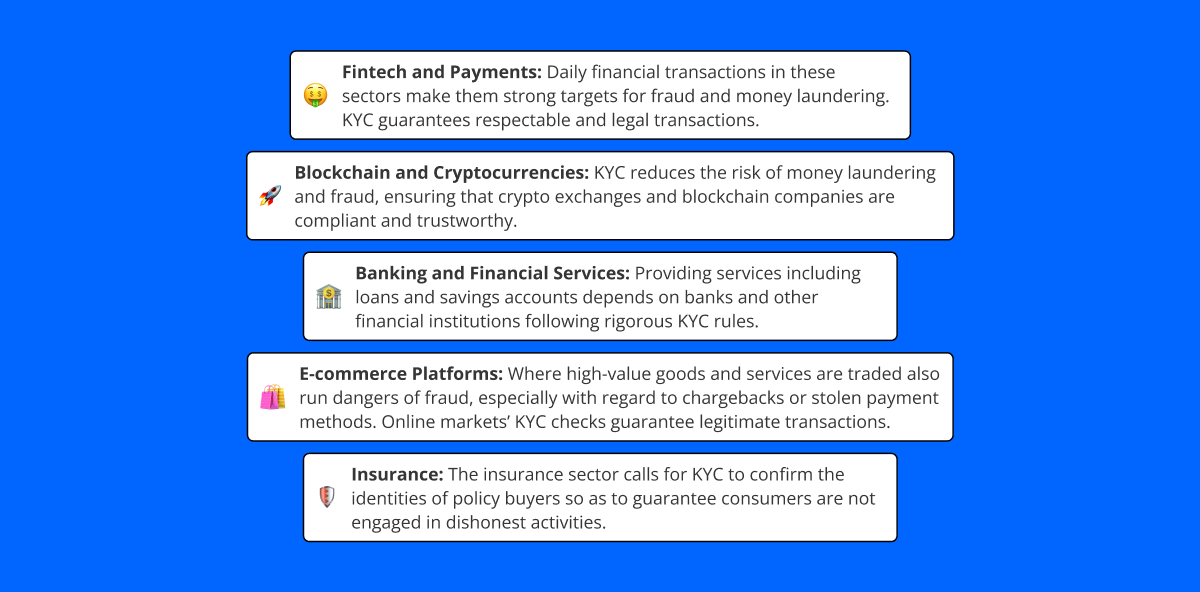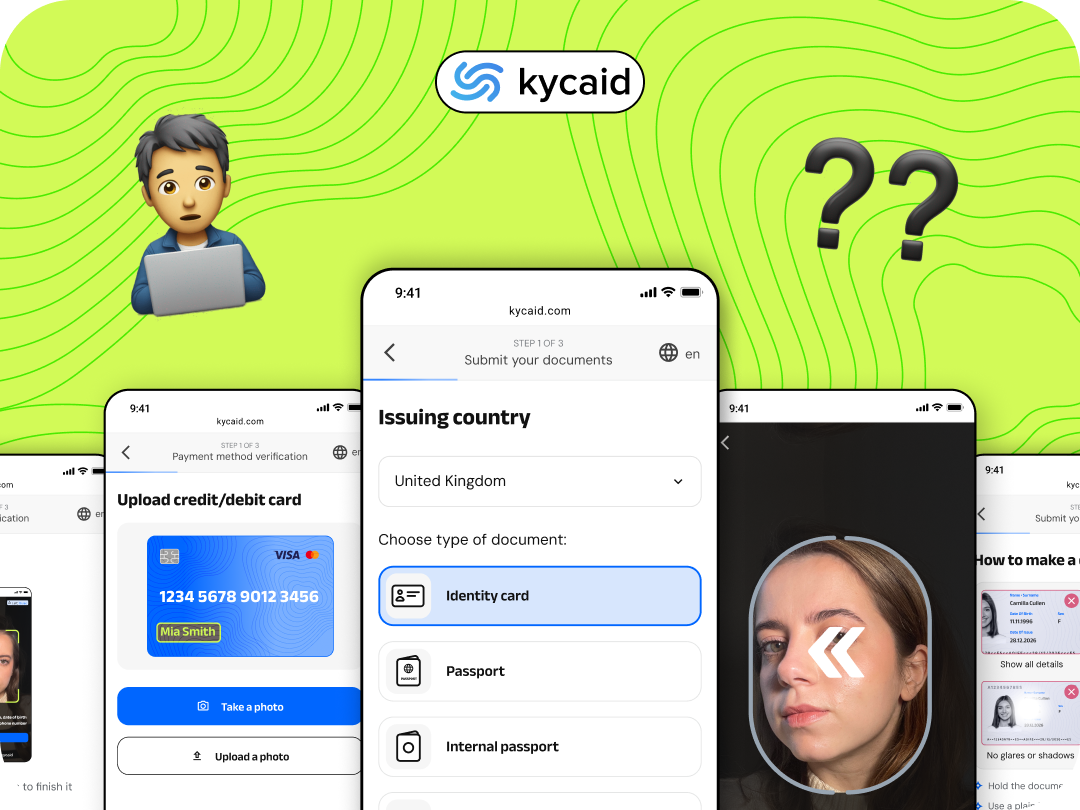Early-stage startups must navigate KYC and AML compliance to scale successfully. KYC onboarding guarantees consumers are who they represent, thereby enabling companies to comply with rules, avoid fraud, and establish confidence by means of authenticity. Although it could seem like a hindrance, long-term development and security depend on startups implementing KYC from day one.
Why Early-Stage Startups Should Give KYC Some Thought
Startups may not have a large budget or sophisticated technology, but they still have to have solid security and compliance bases. Early KYC adoption can yield long-term advantages much beyond the first outlay of funds and work.
Establish Trust with Users and Partners
Early-stage companies must build confidence with business partners as well as with users. Using KYC processes shows that your company takes user protection and security seriously, thereby establishing credibility in your field of work.
Banking Integrations and Safe Payments
To combine their offerings, banks and payment companies may call for KYC checks. Your startup can suffer to access necessary payment and banking infrastructure without these processes in place, therefore impairing your capacity to run and grow.
Lead Ahead of World Standards (AML/KYC Compliance)
AML compliance for startups and KYC rules is about future-proofing your company rather than only legal compliance. Many areas and businesses have specific KYC standards; hence, keeping compliance from the start helps to avoid later legal obstacles and expensive fines.
Quick Look at Sectors Where KYC Is Essential
Although KYC is important in many different fields, some sectors have unusually strict compliance rules:

Top KYC Problems Startups Face
Using KYC in a startup context can provide particular difficulties. Still, knowing and getting ready for these challenges will enable you to pass them with efficiency.
Restraints on Budget
Many businesses live on limited funds, hence focusing on KYC compliance could seem like a luxury. But the expenses of non-compliance—fines, fraud, or reputation damage—can be much more than the cost of building appropriate KYC infrastructure.
Insufficient Expert Knowledge in Compliance
Many times, startups lack the internal knowledge needed to manage challenging regulatory criteria. Many go to outside KYC solutions or engage compliance experts that can lead the company through the complexities of AML and KYC rules in order to handle this difficulty.
UX Against Security Trade-offs
Often there is a fine balance between guaranteeing strong security mechanisms and offering a seamless, user-friendly interface. For new clients, a protracted KYC process might be a deterrent that causes user journey conflict. Maintaining both compliance and consumer happiness depends on striking the ideal mix between security and simplicity of use.
Global Regulatory Complexity
Varied nations have varied KYC regulations, which makes it difficult for firms trying to grow abroad. Two major challenges are knowing the particular needs of every market and keeping current on any legislative changes. Working with a worldwide KYC provider can help to simplify this procedure.
Data Privacy Laws: GDPR, CCPA
Conducting KYC checks can make navigating GDPR in Europe or CCPA in California challenging. Startups have to make sure they safeguard private consumer information in line with these privacy rules, therefore complicating the KYC process even more.
Clever Solutions for KYC Problems: Overcoming Obstacles Using Technology
1. Low-Code or No-Code KYC Integration
Including KYC procedures into current systems might be a big challenge for startups and small teams. Low-code/no-code solutions simplify this process so teams with less technical knowledge may rapidly apply KYC processes. By offering drag-and-drop capability, these easy-to-use systems help to lower the requirement for protracted development cycles. Low-code or no-code KYC integration allows companies to remain compliant while concentrating on their main offering instead of allocating funds to intricate compliance systems.
2. Startup Team Scalable Pricing Models
Budget restrictions are a reality for developing startups. Conventional KYC solutions might be costly and include unstated fees that impede scalability. Scalable pricing policies available from modern KYC providers are especially meant to fit early-stage teams. Tiered or pay-as-you-go pricing guarantees that entrepreneurs only pay for what they use, therefore avoiding costly long-term contracts. These variable pricing strategies make compliance reasonable, independent of the size or level of development of the business.
3. Pre-Programmed Compliance Procedures
The industry and regulatory context will greatly affect the KYC procedures. Pre-configured compliance systems alter everything since they let companies rapidly apply legal requirements without creating them from scratch. Customisable, these systems help companies to fit their particular requirements by means of fine-tuning. Startups may minimise the risk of human error in compliance procedures and guarantee they are adhering to industry best standards by employing pre-configured solutions.
4. Fast Onboarding and Mobile-First UX
Retaining customers depends mostly on a flawless and user-friendly experience, especially in sectors like fintech and eCommerce. Offering a quick, frictionless onboarding process, mobile-first KYC solutions guarantee that consumers may finish their verification on tablets or smartphones. Simplifying the Digital KYC for startups process helps companies avoid drop-offs and raise conversion rates. Mobile-first UX frees consumers from the requirement to be hooked to a desktop computer, therefore facilitating a more convenient approach.
5. AI-Based Fraud Detection
AI-powered KYC solutions for startups are transforming company fraud prevention and detection. Using real-time analysis of enormous volumes of data, AI-powered KYC solutions can identify anomalies or suspicious activities during the verification process. These sophisticated algorithms can spot bogus accounts, identity theft, or strange behavior, therefore strengthening KYC procedures.
By integrating AI into their digital KYC for startups, companies can enhance their fraud detection capabilities, protecting their reputation and ensuring strong AML compliance for startups.
6. Document and Biometric Verification in Real Time
Identity fraud is becoming more sophisticated, hence user identities must be validated using several techniques. Real-time document and biometric verification let companies quickly check government-issued passports, IDs, and other identifying records, making sure the person turning them over is the real owner. An extra degree of security comes from biometric checks covering facial recognition and fingerprint scanning. This solution guarantees that companies may rapidly and precisely confirm identities, enhancing security as well as client experience.

Selecting the Correct KYC Provider for a Startup: Methodology
1. Search for Modular Design and API-First Approach
Flexibility is crucial for startups. As your company expands, an KYC API lets you easily manage KYC checks. and connect with your platform. As your compliance needs change, modular designs also let you choose just the KYC elements you require. To hasten development, look for a vendor with easily available APIs with well-documented integrations.
2. Check Data Security and Global Coverage
Your startup might grow internationally, in which case you must pick a KYC supplier with worldwide reach. Make sure the supplier can manage KYC needs across several nations and regions, especially those with convoluted policies like the EU, US, and APAC. Data security needs also to be a primary concern. Search for vendors who follow international security guidelines, such GDPR in the EU, and apply cutting-edge encryption techniques to guard consumer information.
3. Evaluate Ongoing Support, User Experience (UX), and Speed
Many times, startups must rapidly onboard consumers. A KYC supplier who provides a quick and easy onboarding system can save money and time. Search for a service that guarantees a seamless user experience (UX), enabling your clients to quickly submit documentation and authenticate their identities with the least effort. Make sure the provider offers continuous assistance to handle any issues your company may run into as it grows. Especially if you run across several time zones, a responsive customer care staff is absolutely vital.
4. Emphasise Growth-Readiness and ROI
Given your KYC solution's return on investment (ROI), startups especially should give it some thought. Your KYC service should assist you in lowering manual reviews, increasing compliance efficiency, and cutting expenses related to fraud prevention. Think furthermore of how the service will assist in your expansion. Select a KYC solution that will develop with your company and offer scalability or extra capabilities if you enter new markets, increase your clientele, or meet ever more strict regulatory requirements.
Case Studies for Start-ups: Winning with Smart KYC
Here are some actual cases of startups that effectively applied the appropriate KYC solutions to enhance compliance and operations.
Reducing Fraud by Seventy Percent in Six Months: Startup A
The finance startup Startup A struggled greatly with bogus account creation. In just six months, they were able to lower fraud by seventy percent after implementing a complete KYC solution. Through real-time identity verification and document authentication, the KYC provider greatly enhanced their efforts at fraud prevention. Startup A was therefore able to lower financial losses and increase client confidence.
Startup B: Starting Globally in Two Weeks Using KYC
Targeting a worldwide release, Startup B is an international payment system. They required a KYC system able to support compliance across several nations. Choosing a flexible and API-first KYC provider allowed them to integrate the solution into their platform in just two weeks, enabling them to comply with local laws globally. Their fast implementation let them launch without delay and grow quickly.
Startup C: Zero Manual Review Based Onboarding for 20K Users
Startup C had to fast onboard a large number of consumers without compromising compliance. They chose an automated KYC system that handled all customer verifications without human interaction. Within three months, Startup C effectively onboarded 20,000 users—all without a single manual review. Advanced artificial intelligence algorithms and automation from the KYC provider guaranteed efficient verification of every user, saving time and money related to human checks.

Why KYCAID is Designed for Startups
- No Legal Team? No Problem
For startups without an in-house legal team, KYCAID provides built-in compliance advice to help navigate KYC regulations without the need for specialised legal expertise.
- Launch in 2 Days with Ready-to-Use KYC Flows
KYCAID offers ready-to-use KYC flows, enabling startups to launch identity verification systems quickly—often in just two days—ensuring both speed and compliance from day one.
- First 1,000 Verifications—Done Right
KYCAID automates identity verification, ensuring a smooth, compliant onboarding process for your first 1,000 users, laying a strong foundation for growth.
- Fast KYC Setup with No Development Delays
KYCAID makes KYC setup easy and fast, with no development bottlenecks, allowing you to focus on scaling your product while ensuring compliance.
- Simple API, Global Coverage, AI-Driven Fraud Detection
KYCAID’s simple API integrates easily into your platform, offering global coverage and AI-driven fraud detection to protect your users and ensure compliance across regions.
- Integrated AML Compliance via GDPR
With KYCAID, your startup remains compliant with AML regulations and GDPR, managing consumer data ethically and preventing illicit activities without added complexity.
- Competitive Pricing and Flexibility
KYCAID offers competitive pricing, 10-40% lower than many competitors, with a flexible pay-as-you-go model that grows with your business.
- Instant Verification and Reduced Drop-Off Rates
KYCAID’s instant verification reduces drop-off rates by up to 30%, ensuring a smoother user experience and higher satisfaction.
- 24/7 Customer Support
KYCAID provides responsive 24/7 customer support, ensuring quick resolution of any issues with a guaranteed response time of just 15 minutes.
KYCAID Helps You Build Trust and Scale Faster
For startups, especially with regard to compliance, the road to success is sometimes difficult. With KYCAID, though, those difficulties become manageable. KYC is about developing confidence with your customers, guaranteeing partner readiness, and obtaining peace of mind through compliance—not only about fulfilling legal criteria.
Startups can scale quicker and remain compliant with KYCAID's flexible pricing, quick setup, seamless integration, artificial intelligence-driven fraud detection, and 24/7 support. KYCAID expands with your company, offering a solution that adapts to fit your needs.

